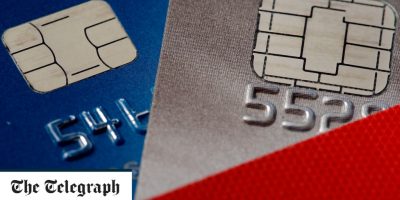Consumers are still having to pay high fees when using credit cards despite new EU regulations that have capped transaction costs. At the same time, the rules have resulted in millions of cardholders losing popular perks such as cashback.
As of December 2015, the EU ruled that the “interchange fee” – paid in the first instance by the shop – on credit and debit cards could be no more than 0.3pc and 0.2pc repectively.
Up to then the typical fee was 0.8pc, with shops passing on the cost to customers either through higher prices or explicit credit card usage fees.
- How Brexit will affect your money: investments, currency and more
- Latest interest rates predictions: First rise in ‘December 2019’
The intention of the EU’s new rules was to lower this cost and with the hope that consumers would benefit from lower prices and fees.
But many readers have contacted Telegraph Money confused as to why they continue to pay far more than 0.3pc when using a credit card. Airlines such as Ryanair and Easyjet still add a 2pc charge, for example, and some cinemas charge over 5pc –in the form of fixed-sum “card handling fees”.
The regulations make clear that shops and other sellers of services “must not charge consumers, in respect of a given means of payment, fees that exceed the costs borne by the trader for the use of that means.”
In other words, these fees shouldn’t be used to boost retailers’ profits.
James Daley, Fairer Finance
But with some firms charging nothing, and others 2pc or more, that is precisely what Your Money readers, among others, believe is happening.
James Daley, managing director of consumer campaign group Fairer Finance, said: “There doesn’t seem to be anyone policing credit card charges. Nobody is stepping up to these companies and asking them why they apply a 3pc surcharge when others process cards transactions for free.”
According to the Department for Innovation and Skills, unfair surcharges are only looked into when there is a complaint. The first point of call is consumers’ local trading standards office.
Complaints are rare, partly because the sums are often small – but also because the companies that levy the charges are quick to justify them.
The industries that charge
Richard Koch, head of policy at trade body, the UK Cards Association, said the worst offenders are airlines, cinemas and travel agents.
When paying for a flight, customers could expect to pay a 2pc credit card charge with Ryanair. EasyJet applies the same 2pc charge plus a £13 “administration fee” which it adds to all bookings. Flybe and Monarch charge 3pc.
Ryanair told Telegraph Money that the charge reflected the cost of processing credit card payments, including bank fees.
Easyjet took the same line. A spokesman said: “The 2pc transaction fee applied to credit card payments covers all costs associated with processing the transaction of which the bank charge is just an element.
“Other associated costs have increased significantly, particularly in relation to card data security.”
Online travel agents apply charges too. Customers who book a trip through Travel Republic could expect a 1.99pc surcharge if paying by credit card and Thomson applies a 1.5pc fee.
Rail firms and cinemas also charge. Everyman Cinema adds 75p to every ticket booked online.
Even the Government charges taxpayers who pay with credit cards – although here at least theses fees appear to be falling.
Until recently, the government charged a 1.5pc fee for those who wanted to pay tax by credit card. As of April 1, it has been reduced to “better reflect the costs associated with different credit cards.”
These are the charges applied by HMRC:
When asked about the varying costs, an HMRC spokesman said: “We don’t make a penny from credit card charges. We are merely passing on what we are charged for processing a credit card payment.
“We have introduced and published separate rates to better reflect the costs associated with different credit cards.”
A surcharge is not applied when paying for driving licences and passports. However, the DVLA does add a £2.50 fee to vehicle tax payments by credit card which it says cover the costs of processing the payment.
A number of high-profile firms, such as Trailfinders, do not charge customers for using credit cards.
A Trailfinders spokesman said: “Unlike other travel companies, we don’t charge extra for the use of credit cards or unwanted hidden extras, nor do we charge a premium rate telephone number.”
Sainsbury’s and online marketplace Amazon also do not add on a surcharge.
Homeware retailer IKEA dropped its fee in 2010.
Cashback rewards cut
While the rules appear not to have stopped some firms from levying high card fees, they have had another distinctly negative impact. This is the dramatic decline in cashback and other cardholder perks.
Capital One, one of the biggest credit card providers, was the first to cut its cashback scheme.
It withdrew all of its reward cards in April 2015, saying the EU rules meant they were “no longer sustainable.
A month later, RBS and Natwest announced the end of the “YourPoints” scheme which gave customers one point per £1 spend.
Credit:
Getty images
Tesco Bank* was another provider which slashed its rewards scheme. In November, it announced that customers would need to spend £8 outside of Tesco to earn one Clubcard point, instead of £4 previously.
At the time, a Tesco spokesman said: “As a result of changes in the credit card industry taking affect this year, the amount that card companies earn from businesses who accept credit cards is reducing.”
M&S Bank also cut rewards. Customers were told they would earn one point for every £5 spent from February 2016, instead of the usual £2.
Instead of reducing the cashback, some providers increased the annual credit card fee – Santander’s 123 credit card* went from £2 to £3 a month in January.
Santander suggested the EU commission ruling was part of the decision.
It added: “ The European commission ruling on interchange has significantly reduced the fees banks receive.”
European Commission competition spokesman, Yizhou Ren, said it was too early to judge whether costs borne by consumers would fall.
“It is quite possible that these reductions in interchange fees have not yet been passed on to merchants,” she said.
What to do if you think the surcharge is unfair
If you feel like your credit card costs is unjustified, the first thing to do is to complain to the retailer.
If this doesn’t work, you can complain to your local authority’s trading standards officers.
Another option is to try alternative dispute resolution where an independent party will look at your case to try and help you and the retailer to reach an agreement. According to Citizens Advice, most judges will expect you to try this before taking the matter to court.
Have a question for our experts? Email moneyexpert@Finance.co.uk. The best of the answers are included in our weekly newsletter
* Starred links are provided by a Telegraph commercial partner. All editorial content is entirely independent of these relationships
























Comments